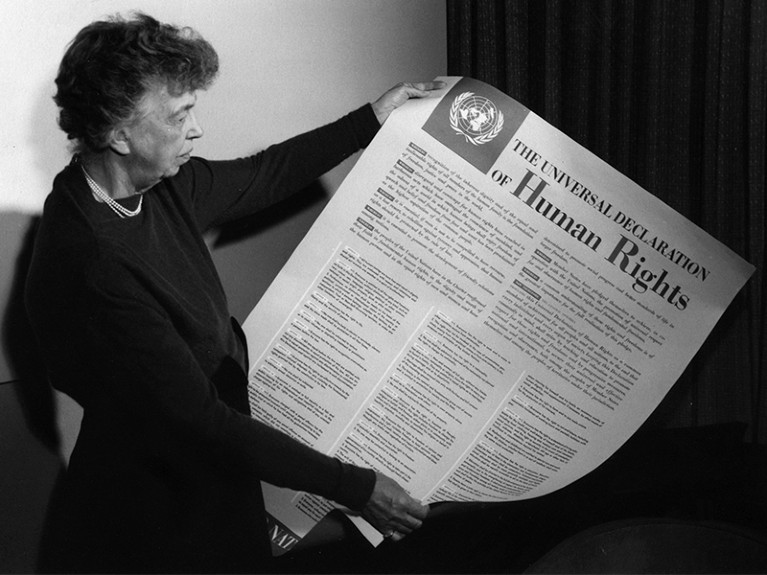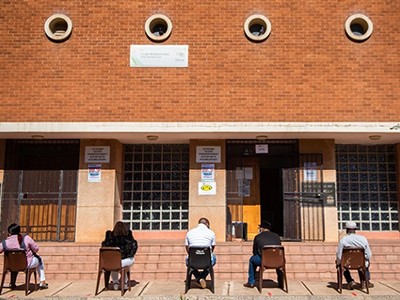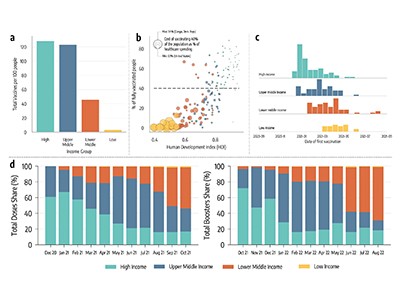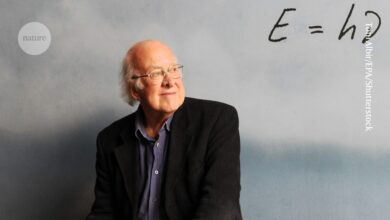
[ad_1]

Eleanor Roosevelt holds the 1948 Universal Declaration of Human Rights.Credit: CBW/Alamy
“Everyone has the right to freely participate in the cultural life of the community, to enjoy the arts and to share in scientific advancement and its benefits.”
So begins Article 27 of the Universal Declaration of Human Rights, the landmark statement on individuals’ rights proclaimed by the United Nations General Assembly on 10 December 1948.
The declaration is a remarkable statement of universal values, the writing of which was accomplished through a process of collective deliberation and compromise. Drafted by a committee of nine people chaired by the US delegate to the UN, Eleanor Roosevelt — the only woman among the nine — it was discussed and voted on by all UN member states, comprising some 50 nations at the time.
Why the pandemic treaty risks becoming COVID-19 groundhog day
Delegates from smaller countries and from those that had just gained their independence made considerable contributions, as did non-governmental organizations. It was India’s delegate, writer and educator Hansa Mehta, who helped to ensure that Article 1 began with “All human beings are born free and equal in dignity and rights”. The original draft began with “All men”.
Article 27 is particularly remarkable, because it enshrines the enjoyment of science — as well as that of art and culture — as a fundamental right to be protected. This contrasts sharply with the current view of many people that science and culture are separate entities. But what exactly is Article 27 protecting?
The scientific landscape has been transformed since 1948, thanks to the digital revolution, the advent of Earth systems research and transformative developments in agriculture, medicine and the life sciences, to name a few examples. But does Article 27 imply, for example, that people universally have a right to enjoy a clean environment and a stable climate — issues that research has brought to the forefront of the public consciousness in the past 75 years? Does it imply that the fruits of medical science should be distributed equitably? Or that access to the Internet — and the knowledge, including scientific insights, that it opens doors to — should be regarded as a basic human right?
Today, we are all too aware that advances in knowledge and the benefits that accrue from them are not getting to the people who need them the most quickly enough — or, sometimes, at all. Science is taking too long to systematically study how countries should adapt to a changing climate. Climate policy has just begun to tackle the question of who should pay for the loss and damage that nations have caused unequally through past and present greenhouse-gas emissions. And we must never forget how the governments of some high-income countries over-ordered, or hoarded, vaccines during the COVID-19 pandemic. More than one million lives could have been saved had vaccines been shared more equitably.
Estimating the impact of COVID-19 vaccine inequities: a modeling study
Over the next year, international meetings will continue on a spectrum of issues for which science is essential. Among them are talks on limiting climate change, ending plastics pollution and protecting the world from future pandemics. On the basis of what we now know, all of these issues could be framed as threats to human rights.
None of the nine committee members who drafted the 1948 declaration was a scientist, although several delegates had scholarly backgrounds in philosophy, education, ethics or law. By contrast, research is now central to most international talks, including discussions on protecting biodiversity and the ocean, and prohibiting nuclear weapons. In some cases, scientists working with human-rights advocates have made countries realize that such agreements are necessary to protect people and the planet — a victory of sorts for the right to science.
But, unlike in 1948, research now competes with larger and better-organized interests in international negotiations. Volker Türk, the UN high commissioner for human rights, did not pull his punches when he wrote in Nature on 1 November that “too many governments, policymakers and big-industry leaders are wilfully shutting their eyes to science” (see Nature 623, 9; 2023). In doing so, they are undermining the value of science to collective action — whether they are launching new fossil-fuel projects or keep increasing the production of plastics.
Seventy-five years on, the right to science is increasingly tied to many other declared human rights. The declaration is both a result of its time and a timeless way of showing how nations drew on knowledge and experience and worked together towards a common goal. As the world stands at an inflexion point of overlapping crises, humanity’s declaration of a right to research should inform how we approach the science we choose to do, and the international lawmaking that results from it.
Source link






